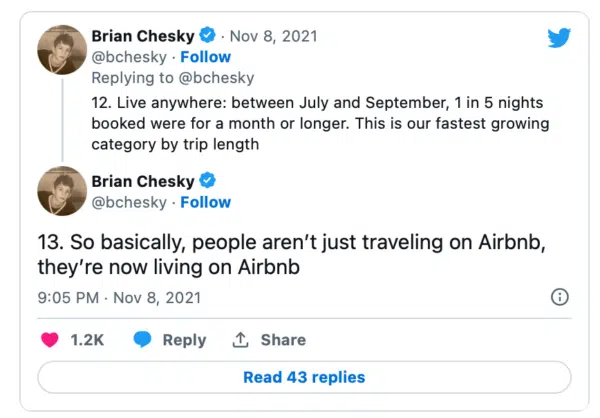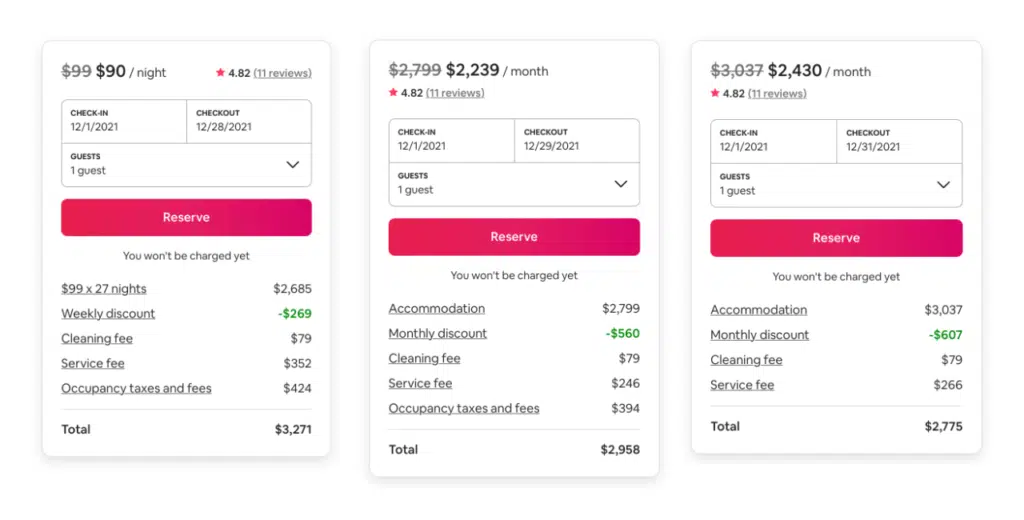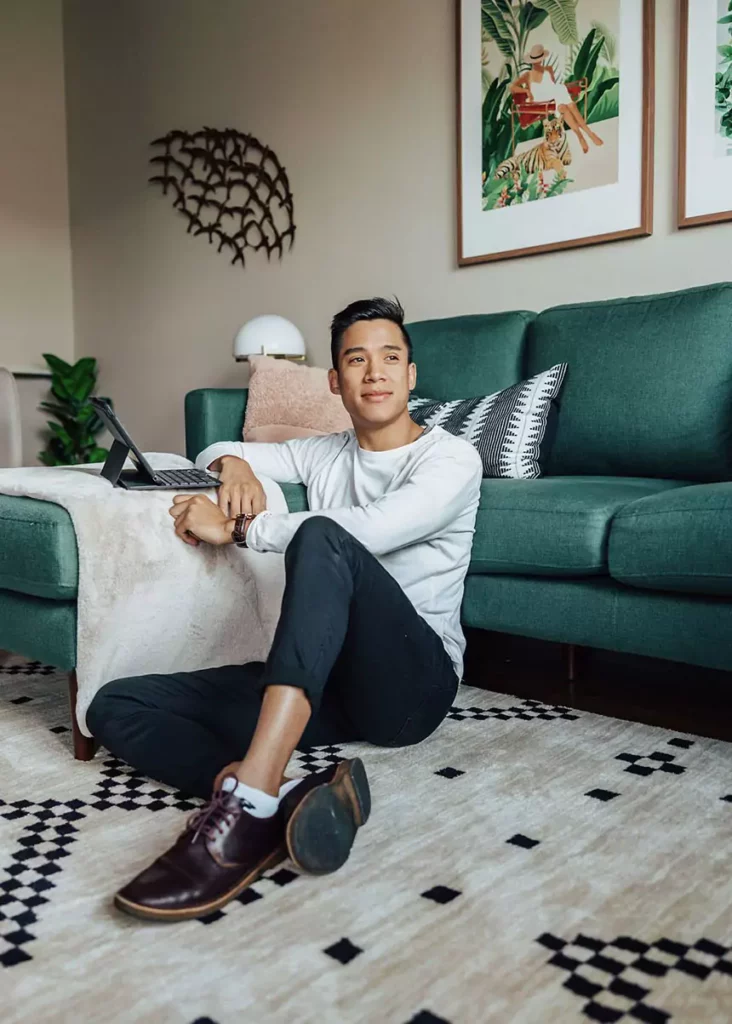
Airbnb’s CEO has claimed he wants to be your next landlord. But does that make sense? We don’t think so, because of Airbnb’s high fees.
Airbnb’s fees make sense for shorter stays, but not for extended stays (28+ nights), which make up to 25% of the nights Airbnb sells each quarter. The reason for this disconnect is that its service fees are too high compared to the value it brings as an intermediary to hosts and guests on these longer stays.
Background: Airbnb has once again reported that a substantial part of its bookings come from extended-stay guests (those staying 28 nights or more). Since 2020, the total number of room nights booked as extended stays has averaged between 15.5-16m each quarter, representing 19-24% of total nights booked on the platform (or the equivalent of nearly 176,000 listings occupied full time). And in certain markets, the figure has been as high as 60%.

Back in late May, a headline from The Verge caught our attention: ‘Airbnb’s CEO thinks the platform can replace your landlord’. In the article, Airbnb’s CEO Brian Chesky said that deposits, long-term leases, and proof of income are outdated.
I think eventually in the future people will start paying for rent the way they pay for cable television, or for Netflix, you pay on a month-to-month basis.
Brian Chesky
And we totally agree with this.
In fact, this is the foundation of our company’s thesis: residential real estate (especially apartment living) isn’t aligned to pillars of the 21st-century economy such as flexibility, convenience, and asset-light lifestyles. But that’s a story for another day.…
That headline from The Verge has been bugging us for six months now, so it’s time for me to get it off our chest…
Let’s be clear on two things:
In this article, we’ll dive deeper into our rationale, based on our experiences running Lodgeur, where 75% of our room nights are rented by extended-stay guests.
Airbnb makes money primarily by charging a service fee to hosts and guests. This fee is predominantly paid by the guest, adding on average 14.2% to their cost, and 3% by the host (in a few markets, only the host pays the fee, and in others, they can elect to pay the whole fee).
From analysis on our own listings, the average guest service fee is a smidge above 14.1%, but drops by a quarter if you book stays of 28 nights or more, to 10.6% or so. In other words, Airbnb can expect to receive 17.1% of the rent and fees charged by the host on short stays and 13.6% on extended stays. The guest may also pay local occupancy taxes, depending on the market and length of stay.
28 nights is also the magic number at which monthly pricing discounts (if offered by hosts) kick in. But a word of advice – if you see ‘Occupancy taxes and fees’ listed, these are often waived at the 30-night mark (depending on the local county, city, and state – we collect three sets of taxes in Houston). Unfortunately Airbnb’s system doesn’t flag this to guests, but we let them know manually. In fact, booking a stay of 30 nights with us is actually 15% cheaper than booking 27 nights once you add up the monthly discount, the service fee discount, and the occupancy tax waiver.
On the stay of 30 nights then, the guest will have paid $2,775 and Airbnb collects $341 between the host and the guest, which is equivalent to 13.6% of the actual cost charged by the host of $2,509 (of which it receives $2,434)

Our research has shown that while Airbnb provides value by making it easier for guests to find a place to stay and for hosts to attract these guests, the key value it sells to each side is trust.
That’s because using a marketplace platform such as Airbnb involves asymmetric information and risks, made worse by the presence of non-accredited individuals and companies (versus hotels). Adverse selection (famously described as the ‘lemons’ problem when buying a used car by Nobel prize-winning economist George Akerlof) arises when information asymmetries arise in a market. This is made worse in markets where consumers cannot inspect the quality of a service/product prior to purchase.
For experiential products such as booking accommodation, there is a high cost of failure. You can return a faulty product, but you can’t return a bad experience. The risk stretches beyond poor quality accommodation, with crime and a risk to personal safety in extreme cases.
That’s why Airbnb goes to great lengths to help build trust and accountability between potential guests and hosts through a variety of design elements (there’s even a TED talk from Joe Gebbia, co-founder of Airbnb on the subject).

The question is, what is the value of this peace of mind provided by Airbnb?
To answer this, take a second to think about a bad experience you’ve had with booking accommodation, be it a hotel or short-term/vacation rental.…
How soon did your gut tell you that there was something wrong?
Our guess is that for most people, your mind was made up within the first 24-hours or less.
On a short stay of a few nights, you probably don’t mind a portion of your fees going towards peace of mind – say $40? But on an extended stay, how much are you prepared to pay on an ongoing basis once you’re satisfied with the quality of the product?
Airbnb’s service fee adds 10.6% to the cost of an extended stay, adding hundreds of dollars to the monthly rental cost. If you were going to book a place to live on Airbnb for a year, you could get six weeks free by booking directly with us, the operator. Our longest stay to date, by the way, is a whopping 371 nights (and counting!). And our average extended stay guest spends 70 nights with us.
The truth is, Airbnb has captured the market for extended stays because people don’t know where else to book a place for a few weeks or months. There is no dominant mid-term stay website that has the same brand recognition or reputation as Airbnb.
But why would you continue to keep paying Airbnb each month? Some people do, but many guests will prefer to book direct, particularly if the host is a professional operator that has the capability of processing direct bookings.
Read our follow-post for some easy tips to save money on your next stay. Or check out our guide on renting long-term furnished apartments. To make things easier, Lodgeur offers monthly payment options for stays over 30 nights. Place a deposit now and pay for your first month 14 days before checkin. (You will see the details on the booking page.)